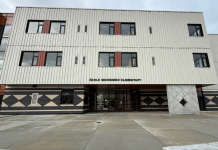To better protect people and improve community defences against climate change, the Province is providing funding to communities across British Columbia for disaster risk resilience and climate-adaptation projects.
“Climate change is no longer a future concern, it’s happening now and we’re seeing its impact all over British Columbia,” said Bowinn Ma, Minister of Emergency Management and Climate Readiness. “Through disaster mitigation funding, our government is committed to helping communities become more resilient by empowering local governments to adapt to the changing climate and better protect themselves and their residents against future climate challenges.”
Sixty-five communities will receive approximately $56 million for 78 projects from the Community Emergency Preparedness Fund (CEPF) through the Disaster Risk Reduction – Climate Adaptation stream. This funding will help communities tackle current vulnerabilities, minimize the risk of future disasters and support communities to make informed decisions.
Funding includes approximately $1.2 million through the program’s October 2023 intake to tackle drought conditions in the Sunshine Coast Regional District by supporting the shíshálh Nation’s Lower Crown Reservoir project. The reservoir will capture water from Chapman Creek to improve access to water and increase water security for people living in the region.
“We want to thank the Province for their support and funding to move the water security project for the Sunshine Coast along,” said Chief Lenora Joe, shíshálh Nation. “By working with our partners at the Sunshine Coast Regional District, we know we can make transformative change creating a better future for all residents. It is only through unifying our communities and working with partners like B.C., that we can tackle climate change and other significant challenges of our time.”
Other projects include:
- creating a green corridor by installing rain gardens, planting trees and native plants around Tillicum Elementary school in Saanich to reduce heat, help mitigate flooding and cut carbon emissions for the entire Tillicum community;
- designing disaster-risk and policy-assessment models in Gibsons to inform planning and policy around risks from climate-related issues such as flooding, erosion and salt-water intrusion to lessen future emergency costs and adapt to climate change;
- protecting essential wastewater infrastructure in the northern Village of Lumby by reinforcing riverbanks near the treatment lagoons to improve the longevity of flood mitigation and better serve the local area; and
- preventing soil erosion and protecting riverbanks in Vanderhoof by planting willow saplings along the Nechako River and Stoney Creek to reduce damage downstream, preserve nearby communities and protect the eco-sensitive area to safeguard water systems from climate-related threats.
The Province has invested $369 million into the CEPF since it was established in 2017. Approximately $279 million has been provided to local governments and First Nations through the CEPF for approximately 2,100 projects. This includes approximately $176 million to support disaster-mitigation and climate-adaptation projects.
The CEPF supports local governments and First Nations to better prepare for disasters and reduce risks from natural hazards in a changing climate in several categories. In addition to disaster-risk reduction and climate adaptation, other categories include:
- volunteer and composite fire department equipment and training;
- emergency operations centre equipment and training;
- public notification and evacuation-route planning;
- Indigenous cultural safety and cultural-humility training; and
- emergency support-services equipment and training.
The CEPF is administered by the Union of British Columbia Municipalities (UBCM) on behalf of the Province.




